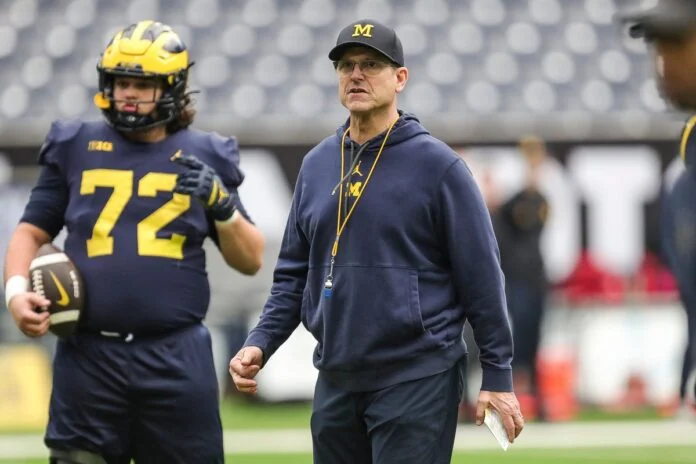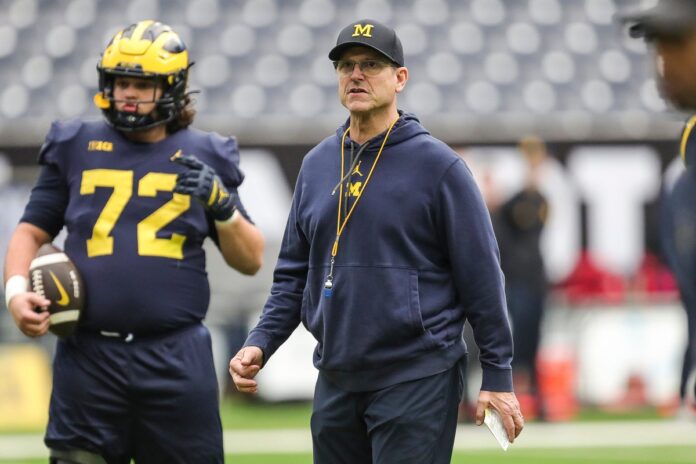
Jim Harbaugh is widely believed to be ready to return to the NFL. He recently led Michigan to the national championship. He has stated that he wants to win the Super Bowl. He spoke with NFL teams in each of the previous two winters. He recently engaged Don Yee, an agent with vast expertise negotiating NFL contracts, and he has yet to sign the deal that Michigan gave him last month.
However, those close to Harbaugh and the Michigan program have a totally different impression: he has the option of leaving, but he wishes to stay.
Jim Harbaugh is widely regarded to be prepared to return to the NFL. He recently led Michigan to a national championship. He has said that he wants to win the Super Bowl. He spoke with NFL teams during the prior two winters. He recently hired Don Yee, an agent with extensive experience negotiating NFL contracts, and he has yet to accept the agreement Michigan offered him last month.

Those close to Harbaugh and the Michigan program, on the other hand, believe he has the choice of leaving but prefers to stay.
According to those familiar with the conversations, Harbaugh wants contractual assurance that if the NCAA takes action against him based on information the school already has, Michigan will not be able to remove him “for cause.”
Consider this from Harbaugh’s perspective. His contract is with Michigan, not the NCAA. He clearly disagrees with the NCAA and Big Ten interpretations of specific events. An NFL franchise would offer Harbaugh a fully guaranteed contract. Why would he turn it down to stay at Michigan knowing he could be fired eight months later, with no severance, due to an NCAA ruling?
Harbaugh has worked at Michigan for ten years. Administrators are already aware of his identity. They’ve seen how his players feel about him, their character off the field, the academic climate in the program, and how his teams play—and all indications point to a positive outcome. Harbaugh should be held to the same standards of conduct as all other department heads at the school.
Now, here’s why he might want to stay: Harbaugh is motivated by a competitive spirit that is rare even among football coaches. When a task or problem enters Harbaugh’s mind, he will devote as much time as necessary to solving it, regardless of what he is planned to do. Extremely competitive people are often stereotyped as cruel or soulless, driven solely by winning. However, the competitive spirit within Harbaugh is so linked with his personality that when it is activated, it supplants practically every conventional want, including the desire for money—and, as weird as it may sound, the desire to win football games.
From the outside, it is easy to conclude that “Jim Harbaugh is hypercompetitive; he has already won a national championship, and now he wants to win a Super Bowl.” However, because the competitive energy within him is such an important part of his being and extends beyond football, it is not that simple.
He is not simply attempting to check off boxes on a coach’s to-do list.
He is constantly pursuing the sensation he had Monday night.
Harbaugh has a tremendous fondness for his current players and coaches. He understands that if he continues at Michigan, he will be competing against people he admires, and he knows they have the kind of devotion and dedication he values. He cannot say that firmly about any other NFL team.
But here’s another side effect of Harbaugh’s competitive drive: Because he searches for competition everywhere, he can also perceive win and defeat—and when there’s no scoreboard, he needs to find some way to validate himself. This makes Harbaugh more vulnerable than the public understands.
One of the funny things about Harbaugh is that, because he is so readily caricatured, people frequently guess what he is thinking rather than listening to what he actually says.
In October, he stated, “You want to be where you’re wanted. They enjoy what you do and how you do it, and they tell you so. Your employers tell you this, and it is subsequently reflected in a contract.
One of the amusing aspects of Harbaugh is that, since he is so easily caricatured, people frequently infer what he is thinking rather than listening to what he actually says.
In October, he said, “You want to be where you are wanted. They like what you do and the way you do it, and they tell you so. Your employers tell you this, which is then represented in a contract.
Leave a Reply